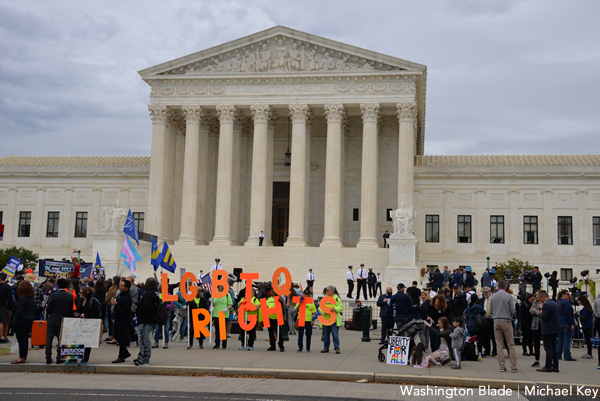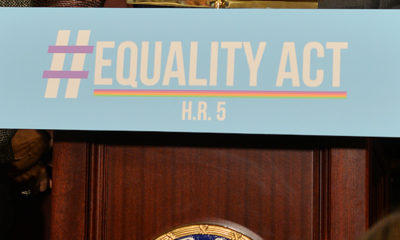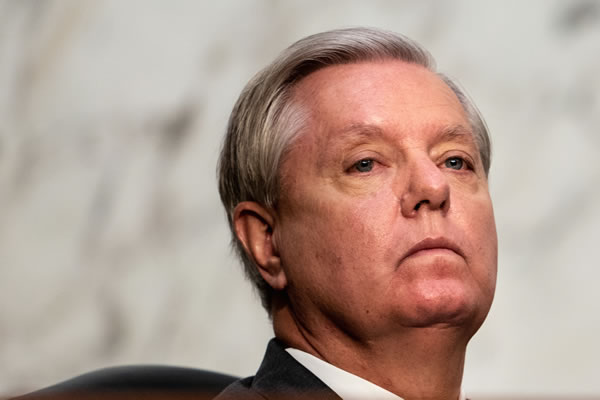News
ENDA’s religious exemption still concerning as vote nears
Brown says religious exemption should be same for LGBT workers as other categories
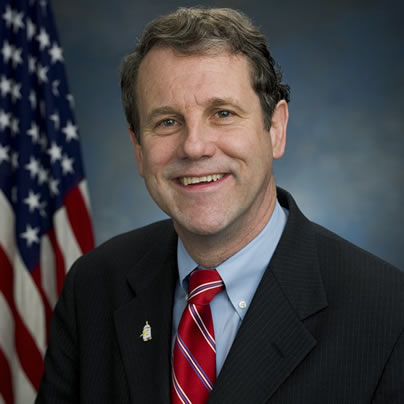
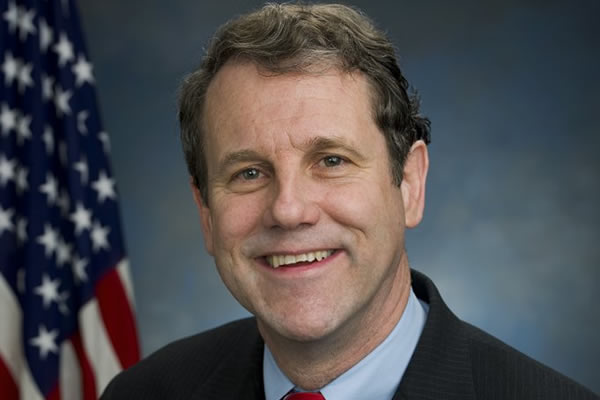
Sen. Sherrod Brown believes the religious exemption in employment discrimination law should be the same for LGBT workers as with other categories (D-Ohio) (Photo public domain).
Shortly after filing cloture on the Employment Non-Discrimination Act, Senate Majority Leader Harry Reid (D-Nev.) held a 30-minute conference call with Nevada LGBT leaders late Thursday in anticipation of the bill coming to the Senate floor this week.
Among those on the call was Derek Washington, lead organizer for the LGBT group GetEQUAL Nevada, who said he raised with Reid concerns about ENDA’s religious exemption.
That language would provide leeway for religious institutions, like churches or religious schools, to discriminate against LGBT workers in non-ministerial positions even if ENDA were to become law. It’s broader than similar exemptions under Title VII of the Civil Rights Act of 1964 for categories of race, gender, religion and national origin.
“I mentioned to him that it was something that just was not palatable,” Washington said. “I asked him what he felt about it, and he felt that the main thing to do was get the vote taken care of, and then deal with it later. As often times happens, you don’t get something perfect the first time around, you go back and fix it later, so that was basically his take on it.”
That account was corroborated by Faiz Shakir, a Reid spokesperson, who said the Democratic leader understands the concerns, but wants to get the bill passed first, then go back and address the exemptions.
“Sen. Reid’s first priority is to pass the strongest possible legislation which can garner 60 votes,” Shakir said. “He believes the current legislation meets that test.”
Washington was unfazed by Reid’s response that the religious exemption won’t see change before passage, insisting the Nevada Democrat is one of the greatest champions for the LGBT community, noting, among other things, he was the first elected official to endorse the National Equality March in 2009.
“I think it would a shame to write a story about any of this without mentioning that that man is a hero to us, and I don’t think people get that,” Washington said.
That symbolizes the situation with narrowing the broad religious exemption in ENDA before the Senate approves the bill. Despite concerns that it’s too expansive, the idea of limiting it at this time — such as the amendment process — isn’t getting a lot of traction either from LGBT advocates or lawmakers.
Instead, those with concerns over ENDA’s religious exemption have more modest aspirations: Get LGBT friendly lawmakers in the Senate to speak out against the language on the Senate floor.
Ian Thompson, legislative representative for the American Civil Liberties Union, is among those saying he’s not seeking an amendment to religious exemption on the Senate floor, but wants the provision addressed in some way.
“By doing that, it’s certainly our hope more and more pro-equality members of Congress and their staff will come to understand the potential harm of the current exemption, and I think we’ll see growing support for narrowing it moving forward,” Thompson said.
Thompson added he’s “definitely hopeful” that senators will speak out against the exemption of the floor, but declined to name any prospects for who would articulate concerns.
Heather Cronk, co-director of GetEQUAL, said her organization “didn’t anticipate” being able to change the religious exemption, but is looking for senators to speak out against the language.
“What we were hoping for for — which hasn’t happened yet because the senators haven’t gone to the floor yet — is for some of the more progressive senators to speak out from the floor against the religious exemption,” Cronk said. “So, we’ll wait and see what happens on the floor to see if we get those statements.”
GetEQUAL has petitioned four senators with a reputation for being champions of progressive values — Sens. Kirsten Gillibrand (D-N.Y.), Elizabeth Warren (D-Mass.), Sherrod Brown (D-Ohio) and Al Franken (D-Minn.) — to speak out against the religious exemption. As of Sunday, the petition has just under 6,000 signatures.
It remains to be seen whether any senator will speak out in favor of limiting the religious exemption when ENDA comes to the Senate floor this week. Of these four senators, the only office who responded to the Washington Blade’s request to comment on the extent of the religious exemption was that of Brown.
Meghan Dubyak, a Brown spokesperson, said the senator’s focus is passing is ENDA, although he shares the belief the religious exemption for LGBT discrimination should be the same it is for other categories.
“Sen. Brown’s top priority is overcoming a likely filibuster and ensuring passage of ENDA,” Dubyak said. “He believes the religious exemption in ENDA should be consistent with the federal law that currently protects people against discrimination.”
In July, Gillibrand said during a Third Way event that said she’d go even further and amend ENDA to remove the religious exemption. However, her staffers have apparently backtracked from that statement as they’re now mum on the issue.
For its part, the White House is staying out the argument over the religious exemption. Shin Inouye, a White House spokesperson, reiterated in an email weeks ago President Obama supports ENDA, but is leaving the details to Congress.
“We look forward to lawmakers moving forward on this bill that upholds America’s core values of fairness and equality,” Inouye said. “While we defer to Congress on the specifics of the legislation, we believe lawmakers will be able to find a balance that protects LGBT workers and religious liberty.”
Since the introduction of ENDA this year, the ACLU has called for narrowing the religious exemption along with groups like GetEQUAL, the National Center for Lesbian Rights, Lambda Legal and the Transgender Law Center, the National Gay & Lesbian Task Force.
On the other hand, groups working on like Freedom to Work, the Human Rights Campaign and the Center for American Progress have endorsed the current exemption in ENDA.
Tico Almeida, president of Freedom to Work, co-wrote the religious exemption currently found in ENDA while working as a House staffer in 2007. Neither he nor HRC responded to multiple requests to comment for this article.
Winnie Stachelberg, vice president of external affairs for the Center for American Progress, said the religious exemption is necessary to enable bipartisan support to move the bill forward.
“The current religious language reflects a bipartisan compromise that represents a pragmatic balance between ensuring that LGBT workers have the protections they need and organizations,” Stachelberg said. “While the religious exemption is broader than other civil rights statutes it will ensure that LGBT workers have the protections they need.”
If anything, the movement in the Senate on ENDA’s religious exemption this week may be more toward expanding it even further.
Sen. Rob Portman (R-Ohio), seen as a potential supporter of ENDA, has said he’s behind the basic premise of the legislation, but has concerns about restrictions on religious liberties and wants to strengthen the bill to ensure they’re protected.
Prior to the committee vote on ENDA in July, Sen. Rand Paul (R-Ky.) had prepared an amendment that would replace the bill’s religious exemption with more comprehensive language for religious employers. It was never brought up before the committee. Paul’s office didn’t respond to a request to comment on whether the senator would introduce the amendment on the Senate floor.
Concerns over the existing religious exemption were ramped up last month when Tippi McCullough, formerly a teacher for 15 years at Mount St. Mary Academy in Little Rock, Ark., was forced to resign after the school learned she had married her same-sex partner in New Mexico. Because the school is a religious institution, it would not be subject to liability under ENDA.
Thompson said the consequences of passing ENDA with its current exemption in place are hard to predict, but said it would be “a dramatic, and from our view, and very troubling expansion of an exemption like this in our federal civil rights law.”
“I think that it wouldn’t be too into the future before we saw instances of employment discrimination occurring against workers who should be protected from employment discrimination and may find out that because the scope of the existing religious exemption that they may not be,” Thompson said.
LGBT advocates who oppose the religious exemption chose their words carefully about whether they want to see ENDA passed this year with the current language — as opposed to letting it die in Congress so that it could be passed with a narrow exemption at a later time.
Thompson said the ACLU has been a “longtime champion of ENDA” because of the protections in the bill “are critically important and long overdue.”
“We’ve endorsed it, so that’s a position that we’ve taken,” Thompson said. “We have consistently, also though, raised concerns about the scope of the religious exemption and said that that is should be appropriately narrowed ultimately before it ends up on the president’s desk, and that’s our view, but at the same time because of the protections that it would afford to LGBT people are so important and so needed, we also support the bill.”
Cronk said GetEQUAL neither supports nor opposes the bill and believes “any time that that pro-LGBT legislation comes up in Congress, we want that legislation to move forward.”
“Our organizers didn’t feel good about organizing in support of the bill because there wasn’t that change to the religious exemption and because the grassroots network we work with feel the impact of that everyday,” Cronk said. “They work in hospitals in the closet, or they teach at schools where they’re in the closet, and they have a really clear sense about who would be left behind by this legislation, and didn’t feel that was in line with our vision.”
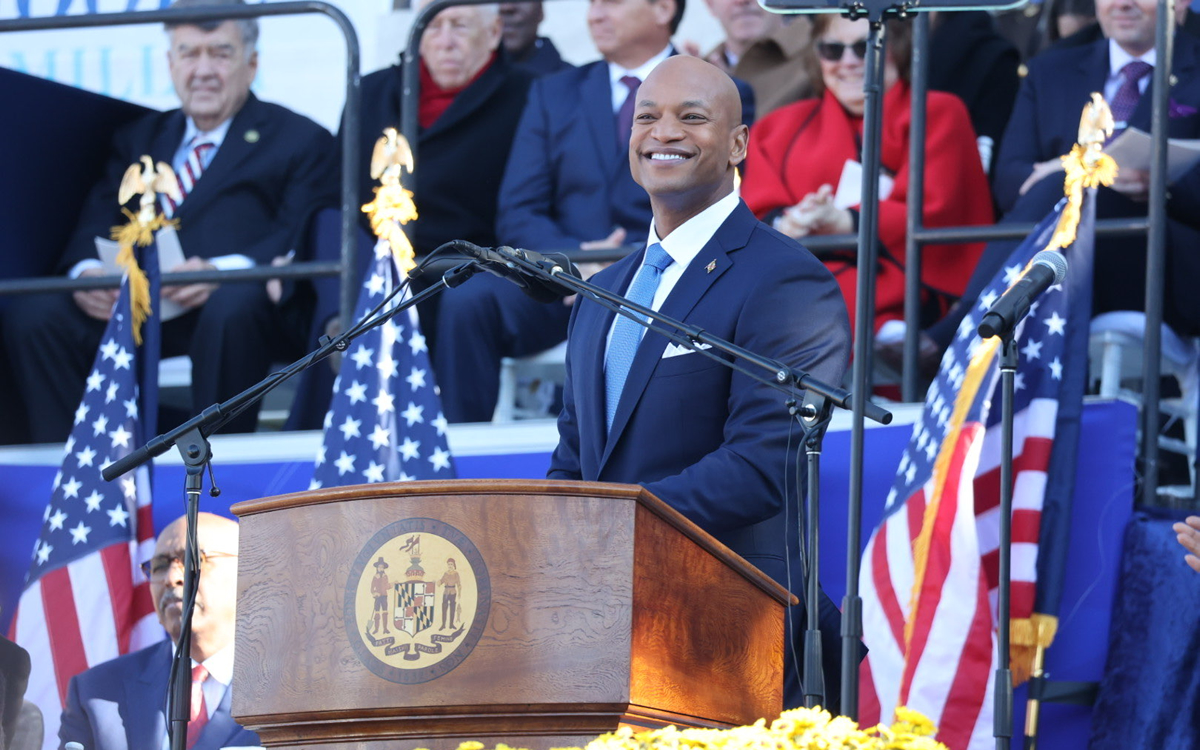
Maryland Gov. Wes Moore on Thursday signed a bill that seeks to combat efforts to ban books from state libraries.
House Bill 785, also known as the Freedom to Read Act, would establish a state policy “that local school systems operate their school library media programs consistent with certain standards; requiring each local school system to develop a policy and procedures to review objections to materials in a school library media program; prohibiting a county board of education from dismissing, demoting, suspending, disciplining, reassigning, transferring, or otherwise retaliating against certain school library media program personnel for performing their job duties consistent with certain standards.”
Moore on Thursday also signed House Bill 1386, which GLSEN notes will “develop guidelines for an anti-bias training program for school employees.”

The Mexican Senate on Thursday approved a bill that would ban so-called conversion therapy in the country.
Yaaj México, a Mexican LGBTQ rights group, on X noted the measure passed by a 77-4 vote margin with 15 abstentions. The Chamber of Deputies, the lower house of Mexico’s congress, approved the bill last month that, among other things, would subject conversion therapy practitioners to between two and six years in prison and fines.
The Senate on its X account described conversion therapy as “practices that have incentivized the violation of human rights of the LGBTTTIQ+ community.”
“The Senate moved (to) sanction therapies that impede or annul a person’s orientation or gender identity,” it said. “There are aggravating factors when the practices are done to minors, older adults and people with disabilities.”
Mexico City and the states of Oaxaca, Quintana Roo, Jalisco and Sonora are among the Mexican jurisdictions that have banned the discredited practice.
The Senate in 2022 passed a conversion therapy ban bill, but the House of Deputies did not approve it. It is not immediately clear whether President Andrés Manuel López Obrador supports the ban.
Canada, Brazil, Belgium, Germany, France, and New Zealand are among the countries that ban conversion therapy. Virginia, California, and D.C. are among the U.S. jurisdictions that prohibit the practice for minors.
The White House
Four states to ignore new Title IX rules protecting transgender students
Biden administration last Friday released final regulations

BY ERIN REED | Last Friday, the Biden administration released its final Title IX rules, which include protections for LGBTQ students by clarifying that Title IX forbids discrimination based on sexual orientation and gender identity.
The rule change could have a significant impact as it would supersede bathroom bans and other discriminatory policies that have become increasingly common in Republican states within the U.S.
As of Thursday morning, however, officials in at least four states — Oklahoma, Louisiana, Florida, and South Carolina — have directed schools to ignore the regulations, potentially setting up a federal showdown that may ultimately end up in a protracted court battle in the lead-up to the 2024 elections.
Louisiana State Superintendent of Education Cade Brumley was the first to respond, decrying the fact that the new Title IX regulations could block teachers and other students from exercising what has been dubbed by some a “right to bully” transgender students by using their old names and pronouns intentionally.
Asserting that Title IX law does not protect trans and queer students, Brumley states that schools “should not alter policies or procedures at this time.” Critically, several courts have ruled that trans and queer students are protected by Title IX, including the 4th U.S. Circuit Court of Appeals in a recent case in West Virginia.
In South Carolina, Schools Supt. Ellen Weaver wrote in a letter that providing protections for trans and LGBTQ students under Title IX “would rescind 50 years of progress and equality of opportunity by putting girls and women at a disadvantage in the educational arena,” apparently leaving trans kids out of her definition of those who deserve progress and equality of opportunity.
She then directed schools to ignore the new directive while waiting for court challenges. While South Carolina does not have a bathroom ban or statewide “Don’t Say Gay or Trans” law, such bills continue to be proposed in the state.
Responding to the South Carolina letter, Chase Glenn of Alliance For Full Acceptance stated, “While Supt. Weaver may not personally support the rights of LGBTQ+ students, she has the responsibility as the top school leader in our state to ensure that all students have equal rights and protections, and a safe place to learn and be themselves. The flagrant disregard shown for the Title IX rule tells me that our superintendent unfortunately does not have the best interests of all students in mind.”
Florida Education Commissioner Manny Diaz also joined in instructing schools not to implement Title IX regulations. In a letter issued to area schools, Diaz stated that the new Title IX regulations were tantamount to “gaslighting the country into believing that biological sex no longer has any meaning.”
Governor Ron DeSantis approved of the letter and stated that Florida “will not comply.” Florida has notably been the site of some of the most viciously anti-queer and anti-trans legislation in recent history, including a “Don’t Say Gay or Trans” law that was used to force a trans female teacher to go by “Mr.”
State Education Supt. Ryan Walters of Oklahoma was the latest to echo similar sentiments. Walters has recently appointed the right-wing media figure Chaya Raichik of Libs of TikTok to an advisory role “to improve school safety,” and notably, Raichik has posed proudly with papers accusing her of instigating bomb threats with her incendiary posts about LGBTQ people in classrooms.
The Title IX policies have been universally applauded by large LGBTQ rights organizations in the U.S. Lambda Legal, a key figure in fighting anti-LGBTQ legislation nationwide, said that the regulations “clearly cover LGBTQ+ students, as well as survivors and pregnant and parenting students across race and gender identity.” The Human Rights Campaign also praised the rule, stating, “rule will be life-changing for so many LGBTQ+ youth and help ensure LGBTQ+ students can receive the same educational experience as their peers: Going to dances, safely using the restroom, and writing stories that tell the truth about their own lives.”
The rule is slated to go into effect Aug. 1, pending any legal challenges.
****************************************************************************

Erin Reed is a transgender woman (she/her pronouns) and researcher who tracks anti-LGBTQ+ legislation around the world and helps people become better advocates for their queer family, friends, colleagues, and community. Reed also is a social media consultant and public speaker.
******************************************************************************************
The preceding article was first published at Erin In The Morning and is republished with permission.
-

 District of Columbia3 days ago
District of Columbia3 days agoCatching up with the asexuals and aromantics of D.C.
-

 State Department5 days ago
State Department5 days agoState Department releases annual human rights report
-

 South America3 days ago
South America3 days agoArgentina government dismisses transgender public sector employees
-

 Maine4 days ago
Maine4 days agoMaine governor signs transgender, abortion sanctuary bill into law

